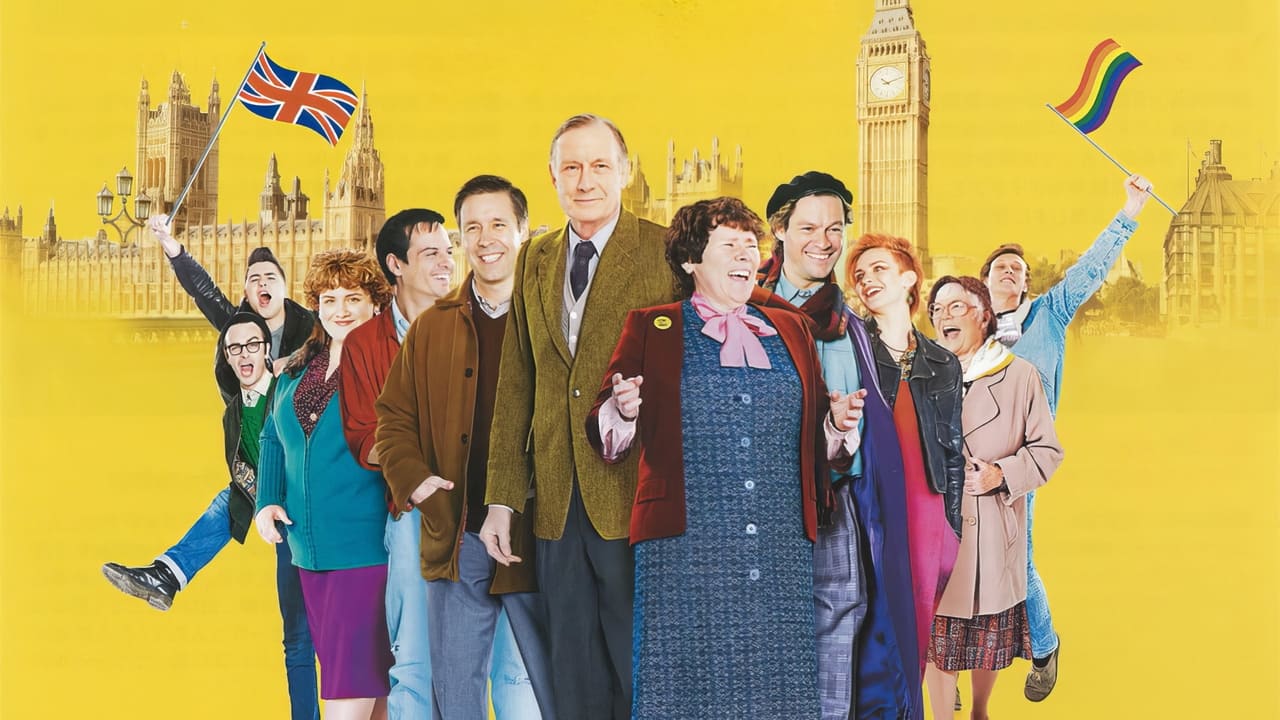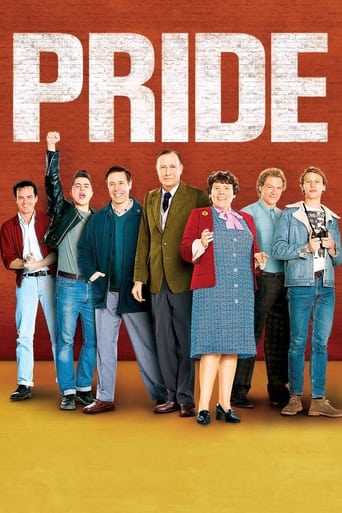

Having viewed this film the day after the events of the Orlando shooting, the story and characters left a scarring view of the continued struggles of the LGBT community. This film was truly mastered with pride and a willingness to discover the truth in danger, but not allow it to destroy the humor in life. These upbeat characters live in a time of Thatcher's reign and oppression, but the love for life is never truly gone. The message behind the story is more than a memoir, it is a respectful approach to the efforts of men to support the very community it had been repressed by.The actors do a wonderful job of approaching these characters with open arms, heart, and all the while displaying the emotional duress that this community still suffers from today. Bill Nighy's reserved character shines through, his development of a closeted man to a openly enthusiastic supporter is something I'm sure some may relate to. Even Joe Gilgun's quite Mike is an important supporting actor and character. His presence is enjoyable and quite frankly relatable to me. As he stands on the sidelines, he still does his part. Every community member's personality type seems to be represented in this wonderful film. The ending is heartfelt and certainly tugged a bit at my heart after seeing Sian's success, and knowing of Mark's loss. This movie is inspiring and everyone should view it. It may open the eyes of the ignorant, and inspire the supporting. Overall, I highly recommend this film especially after the mass shooting in Orlando and keeping those events in mind.
... View MoreIt has taken me two years to catch up with this film. I was invited to an early screening and was unable to go. Something I now regret.I rated the film a 10 because it captures many things from its time so well, despite very few overly sentimentalized moments. The subtext of Bromley Joe's coming out in the context of political action was brilliant because it is a timeless part of the gay experience still. The handling of HIV in the context of the times was also extremely well handled. I was very impressed with the scene at the end in which a gay pride march organizer tries to push the L.G.S.M. group to the rear of the march. His line about "making it fun" as opposed to "political" was an excellent point made. The big lesson I have learned as a gay man in my mid-60's was put across well in this film: We must earn and keep our rights through supporting the rights of others with legitimate causes. This film gets this lesson from the ages across with artful poignancy.
... View MoreWriting a light-hearted comedy-drama based around the homophobic politics of the 1980s and the UK miners' strike might sound like a concept doomed to failure. But Pride miraculously pulls it off, and in spectacular fashion at that. Directed by Matthew Warchus and written by Stephen Beresford, the film derives from the factual story of a group of lesbians and gay men in the 1980s, who raised funds for Welsh miners in an attempt to achieve solidarity. Surprisingly, despite the air of negativity that was prevalent during the decade in which it is set, Pride manages to maintain an upbeat and inspiring tone, without conveying itself to be preachy, which is something of an accomplishment. The feature centres on 20-year-old closet homosexual Joe (George MacKay). During his first visit to a gay pride march in 1984, he becomes inaugurated into a group of gay and lesbian activists led by Mark Ashton (Ben Schnetzer), who decide to support Welsh miners in an attempt to persuade them that they are on the same side, thereby forming 'LGSM': Lesbians and Gays Support the Miners. Before long, the group members find themselves in a traditional Welsh village to convince the local community that they demand similar from the government. However, events take an awry turn as one bigoted member of the community is hell bent on sabotaging their efforts. The majority of the comedy derives from the interactions between the gay characters and the villagers. Menna Trussler is particularly memorable as Gwen, an elderly lady whose interactions with the lesbian characters are not only hilarious but also strangely endearing. Needless to say, of course, Imelda Staunton and Bill Nighy shine in their roles, but it is the younger, main lesbian and gay ensemble that shines the brightest. MacKay and Schnetzer are perfect in their leading roles, and the acting, on the whole, is near-flawless. Pride is particularly commendable for its even-handed delivery of what is essentially a comedy on one hand, and a profoundly emotional drama on the other. It surprisingly refrains from enforcing a preachy one-sided anti-Thatcher commentary, essentially avoiding the subject of politics altogether. Instead, Beresford focuses predominantly on the personal and interpersonal exploits of the mostly fictionalised ensemble and, for the most part, succeeds. Gethin's (Andrew Scott) storyline, which involves his reuniting with his mother, is especially noteworthy in this respect, though it could be argued that it relies too heavily on a common 'gay-themed' plot to induce an emotional response. Likewise, Joe's clichéd 'coming out' storyline feels somewhat old and tired, but Beresford's varied and compelling use of characters, combined with Warchus' fast-paced direction, enables the film to maintain a semblance of freshness. It's nothing unique, but it's well-written, thoroughly engaging and ultimately uplifting. However, for a film that relies heavily on its characters and their circumstances to convey a touching and uplifting story, the emotional aspects of the film are at times surprisingly underplayed. The character of Joe, for example, though presented initially as the protagonist, is disappointingly obscured and overshadowed by the LGSM ensemble throughout the majority of the film, despite his particular storyline bearing the most potential in terms of poignancy. Consequently, this poignancy is never truly realised and his overall underuse makes the film's angle appear uncertain from the outset. Despite this, the film nonetheless maintains a feel-good tone that's full of heart, and makes a profound statement as a firm indication of the progression we've witnessed in the acceptance of LGBT people and their rights since the source basis of this feature. Sadly, the film's few shortcomings preclude it from being regarded as a masterpiece. That said, in spite of its flaws, Warchus' home-grown feel-good feature is undoubtedly a film to be proud of.
... View MoreSTAR RATING: ***** Saturday Night **** Friday Night *** Friday Morning ** Sunday Night * Monday Morning In 1984, the gay rights movement is in full swing, and Mark Ashton (Ben Schnetzer) is a young homosexual who believes the answer is to join forces with another group of people fighting for their rights a bit further from home, in the shape of the striking miners. His plan is to send money from their struggle, to help them in theirs, but Mark hasn't contested the homophobic attitudes held by many miners that would see them throw his money back in his face. But he is persistent, and gradually they come to form an alliance together, while closet gay Joe (George Mackay) battles with his own demons.Very few battles, in the real world, are ever won on their own, by one great, powerful, almighty force. Hell, the only reason I'm not writing this review in German at the moment is because England was helped to win the war by America and Russia. A struggle to overcome terrifying odds is one thing, and battle is an important word when considering this dilemma, but one word is even more important and realistic when put into context: solidarity. That is the thing that ultimately secures victory, hopefully for the right people, in the real world, when people from different backgrounds are united together in one common cause. Pride, if nothing else, deserves some recognition for being one of the few films I know of that highlights this important truth, without trying to make one person or group of people the top dogs.Set at the beginning of the 1980s, when social attitudes were challenged and changing like no other, to the left and the right, it highlights an important turning point in modern culture, and brings an inspiring and engaging story to the screen. That said, sometimes the tone of the film and the style of the content feels more suited to the stage than the screen. It feels like something adapted from a musical, especially during some of the 'dancing' sequences, although it doesn't seem it actually was. Director Matthew Warchus doesn't always keep the narrative flow going in the smoothest or most coherent of directions, and so despite having an interesting sub-plot and numerous subplots on offer, sadly it sometimes loses its way.That said, a mostly young cast do a fine job of keeping the aspidistra flying, with support from older hands such as Bill Nighy and Imelda Staunton on hand to keep everything in perspective. Despite not being perfect, its still inspiring, interesting, and mostly fun to watch. ***
... View More